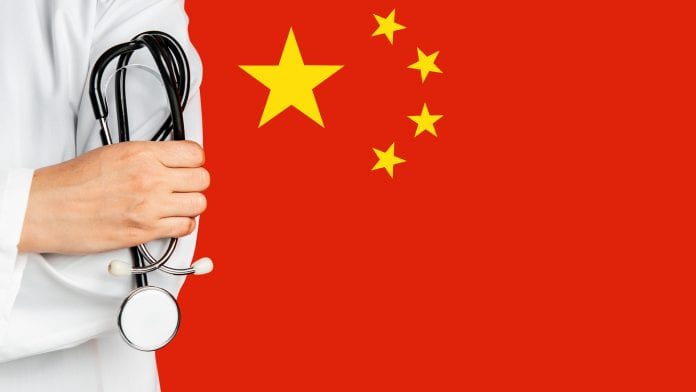
In November 2020, the China Tribunal presented evidence of forced organ harvesting in the country to the UK Parliament’s newly formed China Research Group for the first time.
The China Tribunal’s judgement, delivered by Sir Geoffrey Nice QC, who was joined by China Tribunal Panel Member, Professor Martin Elliott, and Counsel to the China Tribunal, Hamid Sabi, exposed evidence of an illicit trade of forced organ harvesting for over 20 years, contrary to Article 3 of the Universal Declaration of Human Rights, which predominantly targeted practitioners of the Falun Gong religion. This judgement had also previously been delivered to the United Nations Human Rights Council in September 2019.
Health Europa digital editor, Stephanie Price, speaks with Professor Martin Elliott to discuss the implications of the judgement for governments and the medical community across the globe.
Crimes against humanity
Evidence presented in the judgement highlights hostility toward Falun Gong practitioners, a religious movement formed in the early 1990s which focuses on meditation and qigong. Members have been put into ‘re-education’ camps over the past two decades by China’s state party and conclusions made by the Tribunal include that there has been torture of Falun Gong practitioners and Uyghur Muslims.
The judgement has been informed by several sources such as statistical analysis and witness accounts, including evidence from Edward McMillan-Scott, a former Member of the European Parliament. McMillan-Scott told of accounts of Falun Gong practitioners ‘concerning torture and of increased repression before the 2008 Olympics.’ The judgement highlights that, whilst in the camps, members of Falun Gong underwent medical testing, including blood tests and ultrasound examinations.
Professor Martin Elliott said: “Our Tribunal was shown convincing evidence of forced organ harvesting in China. Ethical transplantation requires consent. Anybody who requires an organ transplant is going to be desperate to find an organ, as there is often a very long waiting time and they will die without it. From a medical point of view, you can see why people become desperate. To get an organ, someone needs to take it out of one individual to put in another, and the donor must match the patient in terms of blood and tissue type.
“Currently, most countries in the world have a database of donors who have consented to having their organs donated, and a similar database for those waiting for organs. Matching these two databases is critical, ethically and for safety.
“The moral issue is that organs cannot be taken from someone who does not consent, as this amounts to an assault. In this case of forced organ harvesting, someone has used their skills as a surgeon to take organs from people without consent, sometimes causing their death, and put them in a recipient. In every case of an individual receiving an organ, the origin of that organ must be known along with any health problems the donor may have had, such as cancer, for example, as this can massively impact on the recipient.
“We know that some of the organs have gone to Israel, Australia, and other parts of South East Asia, and it is highly likely that most will have been used inside China itself. Our inquiry formed the opinion that there is a significant commercial element to organ harvesting in China as well as the fact of imprisonment without people committing any significant crimes, such as the Falun Gong and other ethnic groups. There is a camp structure which has lent itself to this kind of commercial and strategic policy decision.”
The Chinese government were asked on several occasions to submit evidence or counter claim to the Tribunal via the Chinese Embassy, however, they did not provide this. In a response to the Judgement’s findings, the Chinese Embassy in Britain told the Guardian: “The Chinese government always follows the World Health Organization’s guiding principles on human organ transplant, and has strengthened its management on organ transplant in recent years. On 21 March 2007, the Chinese state council enacted the regulation on human organ transplant, providing that human organ donation must be done voluntarily and gratis. We hope that the British people will not be misled by rumours.”
Governments and the medical community have a moral responsibility
The judgement highlights the failure of governments across the globe to investigate the allegations, noting that any person or organisation that interacts with the People’s Republic of China should recognise that they are “interacting with a criminal state.”
Elliott said: “The response from different governments has been variable – some have acted fast to ensure people cannot get access to these organs, whilst others have not accepted the evidence. Unfortunately, there is very little transparency in China and there is no open, published data available for scrutiny.
“The global medical community has a moral responsibility to pressure China into great transparency to stop this from happening. China has several sound and excellent institutes that work to a high moral standard; however, the country is so large it is likely that these practices are happening in some of China’s institutions. Unless medical authorities push them on these inconsistencies there will be a moral burden on dealings with China.
“Universities and hospitals all want to be working with China for a number of reasons – including commercial. I think the bare minimum the medical community can do is to retain a high level of suspicion and demand accurate data. For example, a certificate that no organs have been taken against anyone’s’ will. We are arguing the dialogue needs to be informed, and that judgements like the China Tribunal should not be ignored. These actions should not be separated from human rights abuses such as detention, psychological trauma, and sexual abuse. Large numbers of people were held in detention camps in China because of their beliefs or ethnicity, and organ harvesting is only part of a pattern of appalling human rights abuses in those camps, including torture, sexual abuse, and psychological trauma.
“The China Tribunal is an independent jury that has reviewed the evidence from which it is clear that something should be done. It is time for governments to accept the judgement and act – and the best way is to act together and put pressure on China.
“It is internationally unacceptable – governments cannot duck these findings, and neither should the medical community.”
In September 2020, 40 British MPs backed a change to the Medicines and Medical Devices Bill, which intends to repatriate the regulation of medicines and medical devices following Brexit. This amendment would prevent organs and tissue that has been taken forcibly from people from entering into the UK.
Lord Philip Hunt, Baron Hunt of Kings Heath, said: “After some minor rewording, my amendment received government backing and passed through both Houses, with the Bill finishing completion on 11 February. The Bill provided the opportunity to prevent complicity in forced organ harvesting within the UK medicine industry.
“Prior to this Bill, neither the Human Tissue (Quality and Safety for Human Application) Regulations nor the Human Tissue Act required appropriate consent for imported human tissues for use in medicines. My amendment has given powers to Ministers to put this right.
“This is the first time the UK has put into place any legislation to combat China’s forced organ harvesting and it sends a strong signal to China and the rest of the world, that the UK will not tolerate such abhorrent crimes.
“There is much more to do, as due to the scope of the Bill, my amendment could not deal with the issue of organ tourism to China, something we know does unfortunately take place, nor does it deal with the export of organ preservation devices to China from the UK, devices that could potentially facilitate these crimes.
“The travelling circus of ‘Real Bodies’, a commercial exhibition that visited Birmingham in 2018, displaying plastinated corpses and body parts sourced from Dalian, China, could also not be dealt with in this particular Bill, though the Human Tissue Authorities will be tightening up their codes of practice following debates on the issue.
“But this has been a good, solid start to build on for the future.”

























